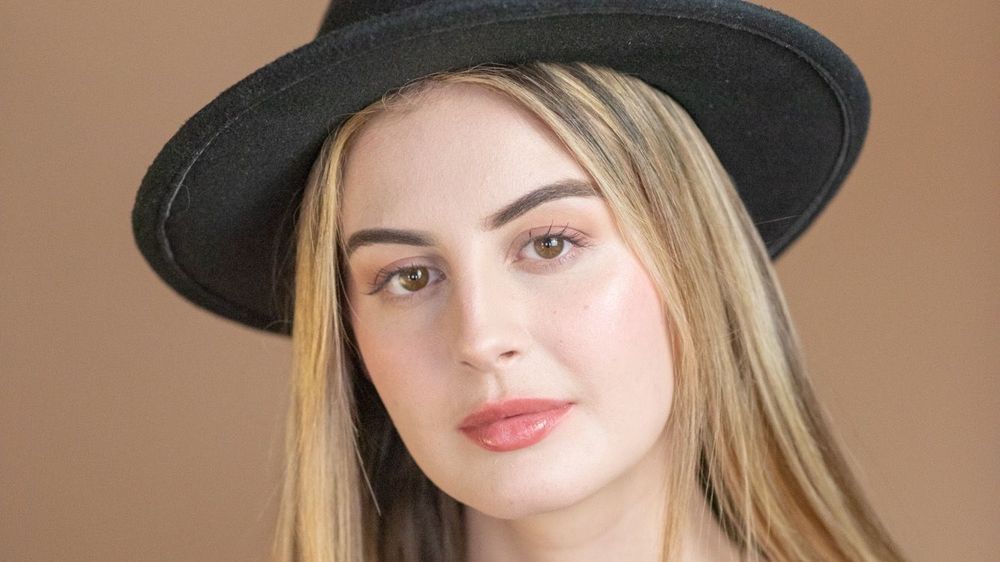Jamie Logan: Passion, pain, and Oreo the goat
Jamie Logan: whether you’ve come across her from high-profile disruptions, national media interviews, or content associated with the many (vegan) pies she has her fingers in - it’s clear that being as well-known and impactful as Jamie is not all roses, but she gracefully takes this in her stride.
V-Land UK (V-L): You've become increasingly well-known over the past couple of years. How are you finding having more eyes on you?
Jamie Logan (JL): There’s definitely more scrutiny - and also support. There’s a great quote about a tree: The more you grow, the more wind there is at the top. Everyone has their opinion on what is most effective and most impactful, so I sometimes get hated on for some of my tactics, but I also get a lot of people who are supportive and say nice things about my content.
I feel we should work together and support each other, and we should try different tactics. I'm always open to learning. I’m human. I’m not perfect; I am trying my best. The worst thing we can do is do nothing at all.
V-L: You have an interesting take on receiving negativity - in that it highlights that you’re reaching non-vegans. Would you say you’re thick-skinned?
JL: I’ve learned to be thick-skinned. Humans are social creatures, we want people to like us, and we want to get along for the most part.
When my content first started going viral I received a lot of nasty comments, including death threats, which upset and hurt me.
I learned to drop the ego part and realise I’m doing this for the greater good and reaching the people I want to reach with this message. It’s not really about us as activists, it’s a reflection of what is going on with them. We are the messengers. Sometimes, people will attack the messengers because they’re not ready to hear the message.
V-L: Take us on the journey from your first step into activism to disrupting New York Fashion Week - which key moments led you to that endpoint? Did you try other approaches to activism and felt they weren’t having the desired impact?
JL: I became vegan in 2018, and for the next six months I didn’t want anyone to know I was vegan. I was very quiet about it.
Then I went to stay with a cousin in California who was organising Cubes of Truth (holding TV screens in public places to show people standard practices of what happens to animals). I got so upset with the footage that I could no longer just stand by - I wanted to do everything I could to end the animals’ suffering.
You tend to have this optimistic view when you first go vegan, that you'll just be able to show people the footage and they'll change like you did, then there's a rude awakening where you're showing people the footage and they're not changing. And in fact, they're arguing with you. It's really upsetting, so you go through this ‘angry stage.’
I began getting more involved in protests and demonstrations. I also started going to slaughterhouses for vigils, and that really lit a fire under my ass! Because I was looking at these animals moments before they were about to be killed and felt I needed to do something about it.
I specifically remember looking at one animal in the eyes (a grey and white goat who I named Oreo), and I spent quite a bit of time with them before they were taken inside. I said to Oreo, I will never stop speaking up for you, one day we’re going to end this. It highlighted the urgency of the issue. There was a transition in my activism from being in a super angry state to using that to fuel impactful activism.
I’m not one to judge others for the styles of activism they want to do. I think do it the best way you know how to. Some actions might not be as effective, but you learn as you go.
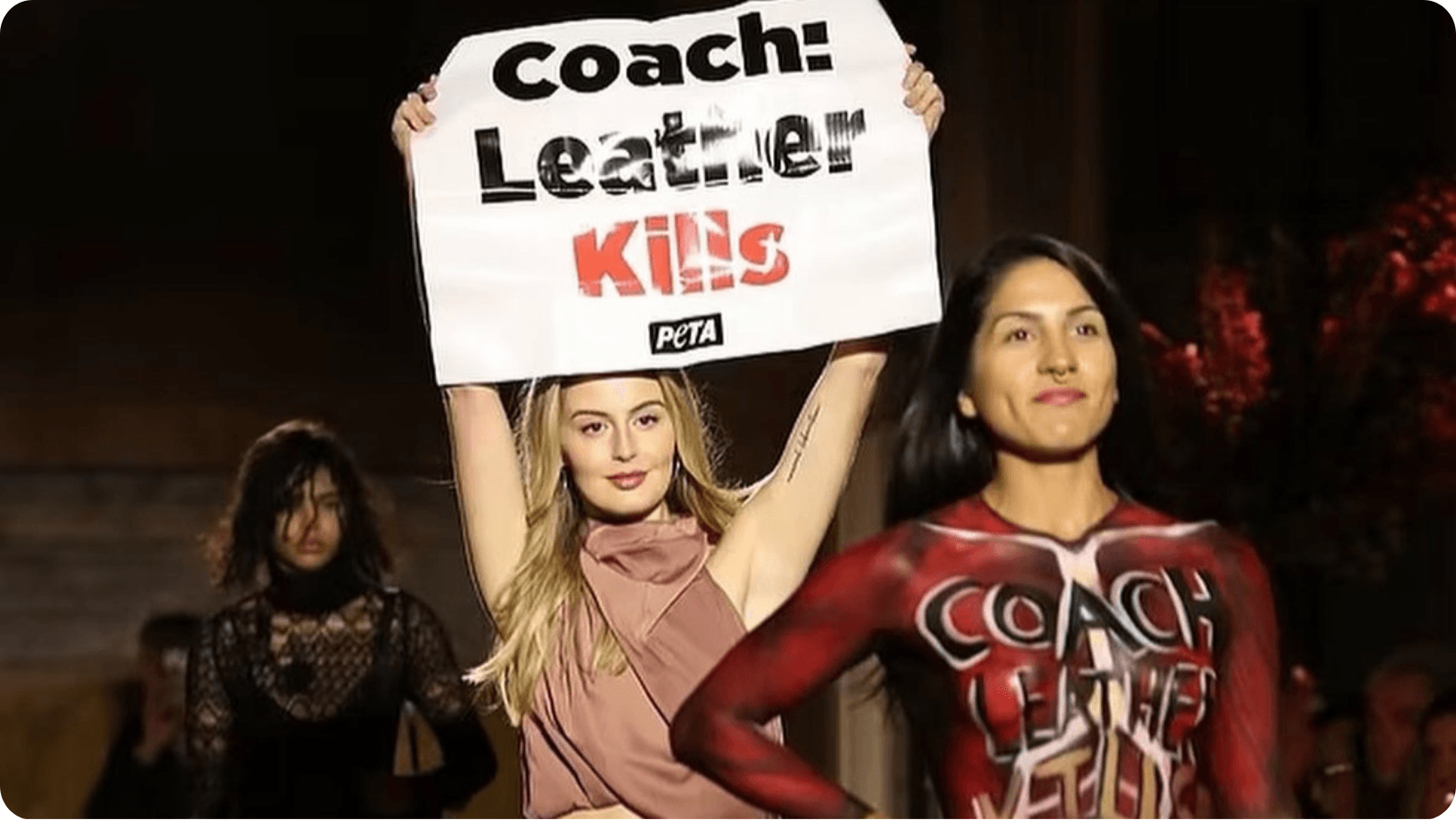
V-L: Which style of activism do you feel you’ve got through to people most effectively?
JL: When I’m being myself. It’s sustainable as I’m simply being myself. My Jamie’s Corner content uses humour and entertainment, but there’s also a seriousness about the subject matter at hand.
Also, the disruptions I’ve done, particularly the Coach’s runway show, which made international headlines (pictured above), and when we asked a Chancellor of the University of Amherst to stop monkey experiments. Instead of screaming at people, the tone and approach we took meant that people were able to focus on the message rather than attacking the optics of how I delivered the message.
V-L: We saw your video where you dressed up as a Lone Star tick and asked people if you could bite them. How do you find doing stunts like that?
JL: It’s uncomfortable at first. I would prefer to not have to do any of this. However, I try to keep in mind: What will get the message out there for the animals in a way that people will engage with?
When I was dressed up as the Lone Star tick, people were approaching me in the park, and it was a fun way for them to think about animal rights. I gave them an ultimatum: Either I bite them (as being bitten by a Lone Star tick causes an allergy to certain meats and potentially other things), or you go vegan for the right reasons - the animals, environment, and your health. It was humorous, but serious.
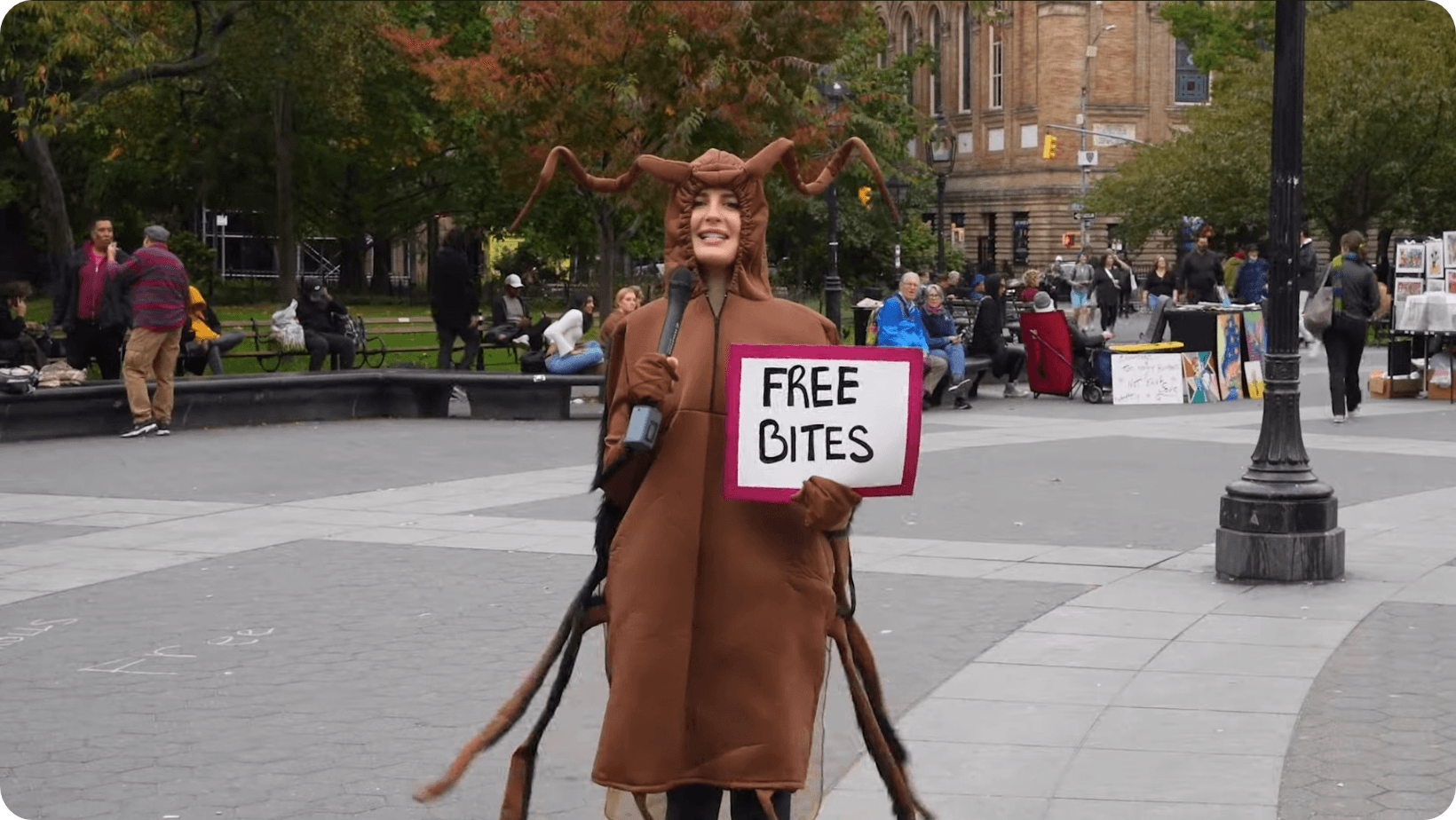
Jamie’s Corner
V-L: You’re a particularly engaging speaker. To what extent has this come naturally to you? Do you just have the gift of the gab, or have there been endless hours of practice and refining behind the scenes?
JL: I think it’s a twofold answer. I think I’ve always been charismatic, high-energy, and I’m a happy person, for the most part.
However, being able to speak about these pressing issues in a way that is professional, clear, concise, and entertaining (so I’m not boring people) took practice - years of activism, interactions with people that weren’t recorded, and doing talks. Also, I read and write a lot which helps me to convey thoughts in an organised manner.
V-L: How did you find your Piers Morgan interview? And how did you manage to stay so composed throughout?
JL: There’s a different way you need to interact when it comes to media versus general conversation. When I have a big interview, I will prep for that! I’ll write out soundbites and know my facts - I research every day. It’s very important as activists that we know what the heck we’re talking about.
I think it went well and was a win for getting some of our points in. I kept trying to bring it back to the animals as much as possible.
If I were to do it again, I would probably be a little bit more aggressive with cutting Tomi Lahren off and making sure I could get across other points, as there was so much more I wanted to say. I made sure that even when Piers was insulting me I kept my cool and watched my tone.
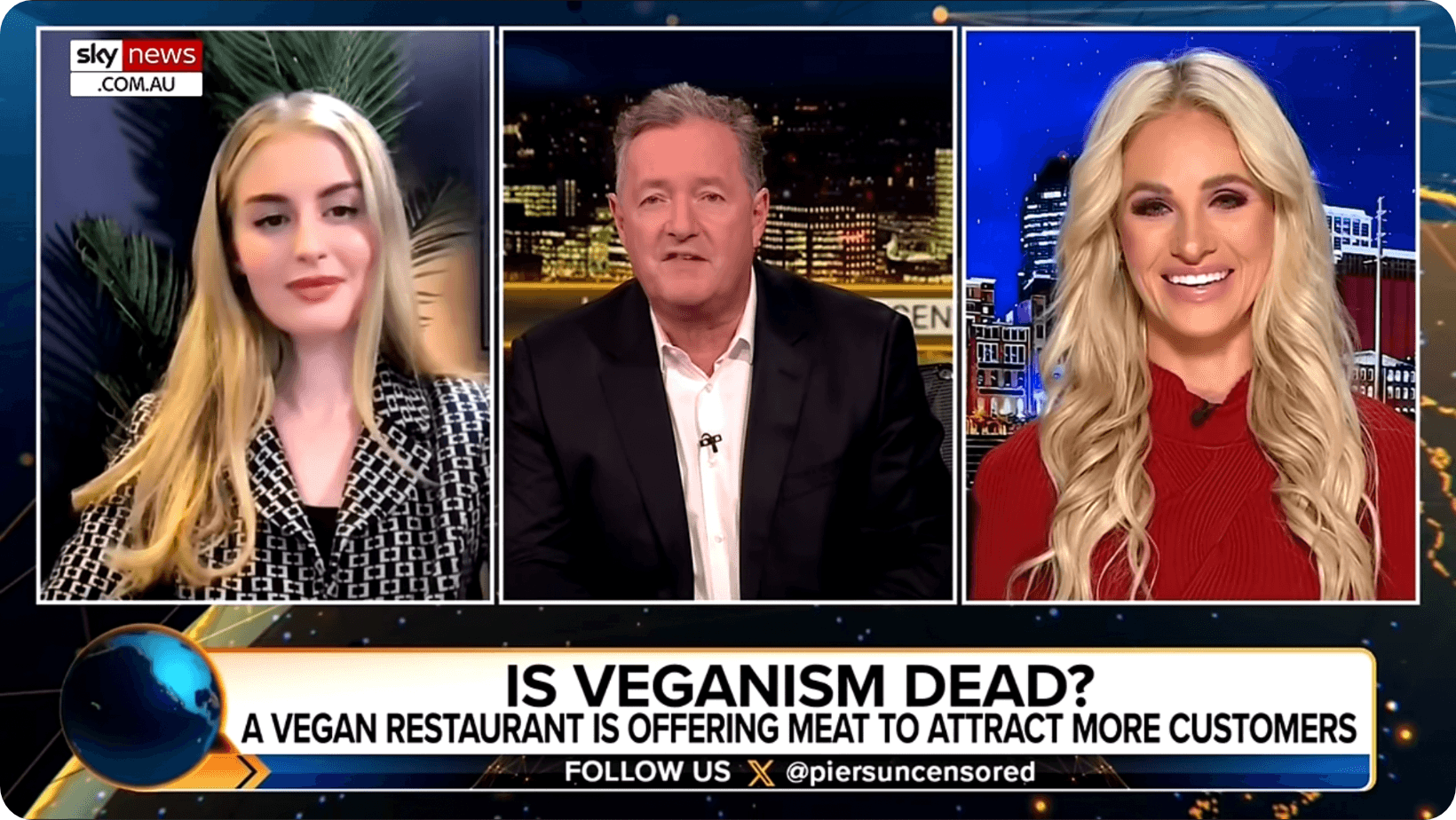
Sky News Australia
V-L: You host Jamie’s Corner. What are some of your most memorable or thought-provoking episodes?
JL: There have been so many amazing guests on my podcast. It’s really a place where I let people speak; it’s a platform for them to share the incredible work they’re doing. I started it in college and then rebranded it to Jamie’s Corner. Originally, it was called Under the Vegfluence, I would drink a bit and then talk about animal rights (those episodes are archived though!).
Recently (episode #64) I interviewed Sharon Gannon, Founder of Jivamukti Yoga. I really enjoyed having her on. She’s been fighting for animals since the ‘80s and preached animal rights and veganism in the spiritual world. She discusses the connection between yoga and veganism; how the happiest people are those who uplift the lives of others; and how what you do comes back to you, so even if you feel like you’re vegan for others, in turn it’s actually helping you in so many ways as well.
There was an episode (#25) called “When You Question Your Veganism,” where a friend of mine came on who I had no idea was feeling that way (she’d been fighting for the animals for years). She admitted that she ate a piece of fish and cheese. I was trying my best not to be judgmental and to be compassionate, but also to try to get her back on track.
A memorable episode (#34) was with Dr. Faraz Harsini. He's a protein scientist, an incredible doctor, and also an activist and voice for animals.
Episode #55 was with Andrea Gung who runs Duo Duo Project, which is an organisation that is dedicated to ending the dog meat trade in China. It was so interesting to have her on because everything she was saying was literally identical to what people say about farmed animals, when they're justifying eating them, the same exact sentiments are said when people justify eating dogs in China. It was a super interesting conversation because she wasn't even vegan. I'm grateful to have amazing guests on and be able to cover a lot of cool topics.
V-L: You were the lead in the powerful, multi-award-winning short film, The Next Girl. Did you always want to get into acting, and how did you find playing that role?
JL: I have a bit of a background in acting. I went to a performing arts high school called LaGuardia in New York City. I studied acting, had classes in all sorts of things, such as on-camera classes and theatre history. As I got older and went into college, I wanted to study something more behind the scenes. I really enjoy directing, producing, and also editing.
Going vegan changed my worldview and acting helps me when it comes to activism. Being able to pair one of my passions, acting, with my life purpose, animal rights and veganism through this film, The Next Girl, was awesome.
A few years ago, one of the producers from The Next Girl had seen my Jamie's Corner content, and they reached out to me asking if I would be interested in reading for the role.
When I read the script I was in awe of how well written it was and the storyline. It really aligned with me, but also I was a little nervous. (It had been a while since I acted and I really didn’t want to mess up this role, so I hired an acting coach for a couple of weeks before the shoot.)
The film tells the story of an adolescent girl who is torn away from her mother at birth and she is then forcefully impregnated and goes through this cycle then has her baby taken away. Some people might think it’s about human trafficking, but then what they come to find out is that it's actually a mirror image of what happens to cows in the dairy industry.
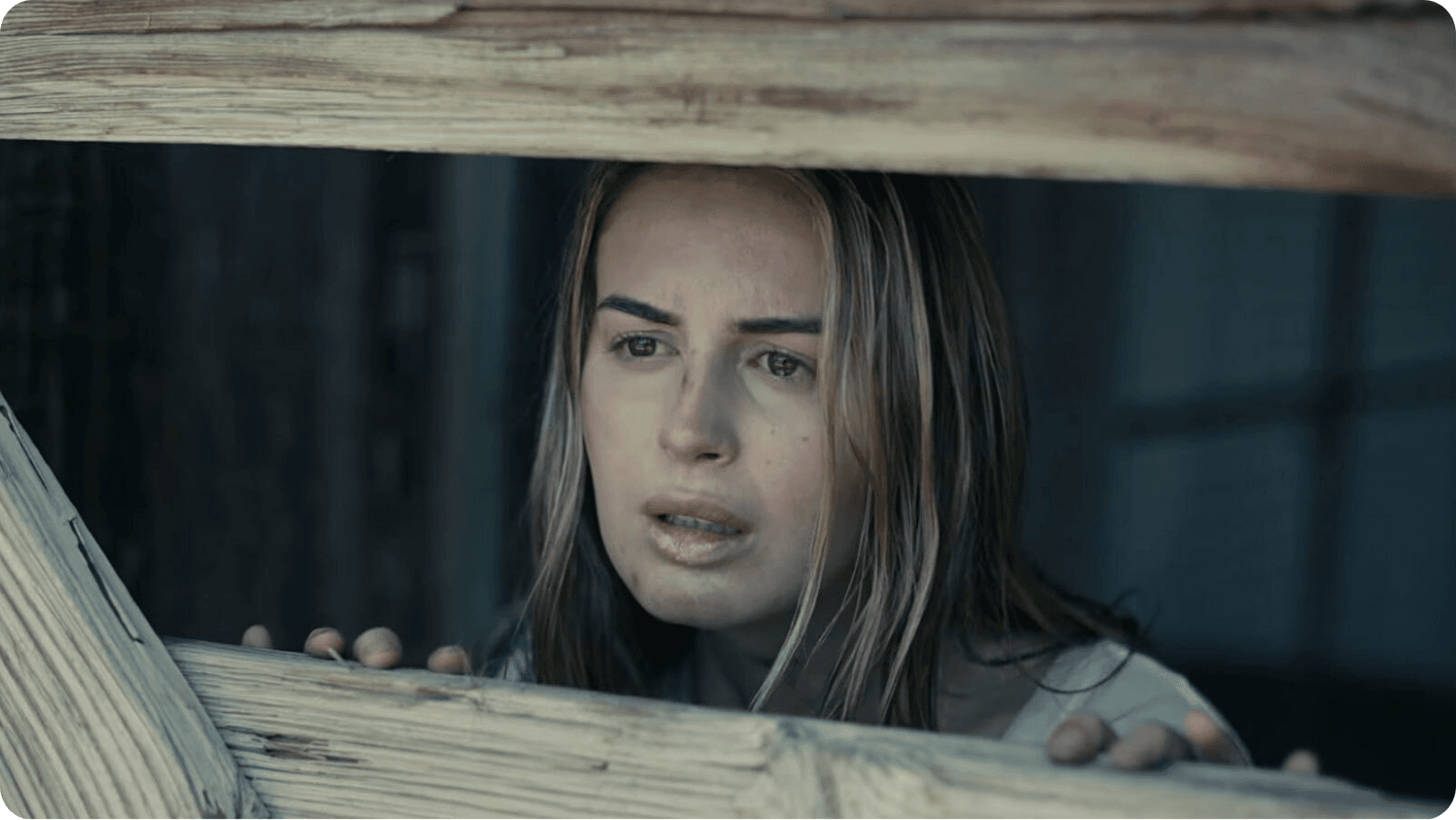
Vkind
V-L: Why do you think so few men are vegan? And do you have any suggestions for changing this?
JL: It's unfortunate, I think it has a lot to do with social pressure. I think that a lot of men are focused on wanting to be big and strong, and they don't even realise that you can do that on a plant-based diet and that there are plenty of vegan bodybuilders. It may be harder for men to make the change because there are fewer people for them to look to. I think that the most manly thing that you can do is to defend the innocent and to stand up for the weak; it’s unfortunate that guys don't necessarily view it that way.
V-L: Are there any things the vegan movement isn’t widely doing that could speed up progress towards a more vegan world?
JL: My perspective on this actually just changed recently. I think we need to do more direct action and we need more people getting arrested. And that's going to sound very controversial at first, but I think when we look at other social justice movements, what has led to the most amount of change is arrests, legislation, and more people willing to step up and do work that is going to really change things for the long run.
One example is what DxE (Direct Action Everywhere) is doing, and what Zoe Rosenberg specifically is doing. I just heard a talk from her, and she's facing felony charges, facing years in prison, but she is getting Sonoma County and California basically to re-look at these laws towards animals.
Rescuing an animal is, in essence, telling their stories. And I love her line where she says, I will not apologise for saving a life. She's trying to get eyeballs on these individual stories of individual animals inside of factory farms. So, I think I'd like to see more vegans doing that. And one other thing is I'd like to see people work together, build community, and stop fighting each other.
V-L: Do you think a vegan world will ever happen?
JL: Yes. And that's why I fight so hard. I'm very optimistic, I think activists need to be. There's a lot of work ahead of us, but if we can't even envision a vegan world, then how do we expect that to happen?
I think when it comes to injustice, it cannot last forever. I think we'll see massive changes in our lifetime, hopefully the end of animal agriculture as we know it. However, I do think that we have to be strategic about certain things and really work together. And we’ve got to keep building in numbers, bring anybody and everybody in, even if they eat animals, bring them in, invite them to protest, because the likelihood is once they learn more information, they will change their actions.
If you’d like to hear from more individuals who believe in the power of humour to help spread the vegan message, check out Rory Cockshaw: Creating a more vegan world, one laugh at a time.
